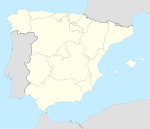Baños de Valdearados
| Baños de Valdearados municipality | ||
|---|---|---|
 Baños de Valdearados - town center with court column (roller blind )
|
||
| coat of arms | Map of Spain | |

|
|
|
| Basic data | ||
| Autonomous Community : | Castile and Leon | |
| Province : | Burgos | |
| Comarca : | Ribera del Duero | |
| Coordinates | 41 ° 46 ′ N , 3 ° 33 ′ W | |
| Height : | 890 msnm | |
| Area : | 36.52 km² | |
| Residents : | 324 (Jan 1, 2019) | |
| Population density : | 8.87 inhabitants / km² | |
| Postal code : | 09450 | |
| Municipality number ( INE ): | 09035 | |
| administration | ||
| Website : | Baños de Valdearados | |
Baños de Valdearados is a place and a municipality (municipio) belonging to the poorly populated Serranía Celtibérica with 324 inhabitants (as of January 1, 2019) in the north of the province of Burgos in the autonomous community of Castile and León .
Location and climate
The place Baños de Valdearados is located in the Castilian plateau ( meseta ) approx. 85 km (driving distance) south of the provincial capital Burgos at an altitude of approx. 890 m . The town of Aranda de Duero is located approx. 17 km southwest. The climate is temperate to warm; Rain (approx. 485 mm / year) falls over the year.
Population development
| year | 1857 | 1900 | 1950 | 2000 | 2018 |
| Residents | 735 | 1,026 | 1,214 | 464 | 342 |
The mechanization of agriculture and the abandonment of small farms have led to a shortage of jobs since the 1950s and, as a result, to a large part of the population moving to the cities ( rural exodus ).
economy
For centuries, the region was dominated by agriculture almost exclusively for the purpose of self-sufficiency ; Animal husbandry and viticulture were also of great importance . Long-life or preserved food such as grain , cheese , sausage, etc. could be bartered or sold at the markets in Aranda de Duero; the region's wine was shipped to Central and Northern Europe. The community is now part of the Ribera del Duero wine region .
history
Finds from Celtic times have not yet been made. The foundation walls and mosaics of a nearby country estate ( villa rustica ) date from late Roman times . Finds from the Visigothic and even from the Islamic - Moorish period have not yet been made in the municipality. At the end of the 9th century the area was recaptured ( reconquista ) and repopulated ( repoblación ) by Diego Rodríguez Porcelos (ruled 873–885), the second count of Castile and founder of Burgos . The first written mention of the place name comes from the year 1048: in 1637 Philip IV granted the place extensive judicial independence, which led to the erection of a court column (roller blind) .
Attractions
- The Iglesia de Nuestra Señora de la Asunción is dedicated to the Assumption of Mary ; its new construction began in 1549, but was not completed until about 200 years later. In 1791 the two aisles were added. The eye-catcher of the church is the Renaissance portal protected by a high arch .
- The court column from 1637 rises on a stepped round base in the center of the village.
- Surroundings
- The villa romana de la Santa Cruz, discovered in 1972, is located approx. 500 m southwest of the village near the road to Aranda de Duero; the Roman city of Clunia is only about 21 km to the east. The main attraction of the villa, which was built around 400 AD, is the approx. 66 m² large mosaic in the main room ( oecus ) , which in the lower part shows the chariot drawn by bears of the wine god Bacchus with his companions Ariadne and Pan ; above is a scene depicting Bacchus, Ariadne and 7 other companions. In 2011, several pieces of the mosaic were broken out and stolen; however, the pieces were replaced by copies.
- The former parish church (today Ermita Santo Cristo ) with a beautiful late Gothic portal rises on a hill near the village . The building is dominated by a white statue of Christ.
- In the rock of the hill there are some rock cellars ( bodegas ) .
- Two other chapels are spread across the municipality: Ermita de Santa María Magdalena and Ermita de San Roque .
Web links
- Baños de Valdearados - Photos + Info (wikiburgos, Spanish)
Individual evidence
- ↑ Cifras oficiales de población resultantes de la revisión del Padrón municipal a 1 de enero . Population statistics from the Instituto Nacional de Estadística (population update).
- ↑ Baños de Valdearados - Climate tables
- ↑ Baños de Valdearados - Population development
- ↑ Baños de Valdearados - History
- ↑ Baños de Valdearados - Church
- ↑ Baños de Valdearados - Roman villa
- ↑ Baños de Valdearados - Roman villa



